Governance: Comparing Concepts of Shōtoku and Taizong's Leadership
VerifiedAdded on 2022/09/17
|5
|1151
|22
Essay
AI Summary
This essay provides a comparative analysis of governance concepts as outlined in the 'Seventeen-Article Constitution' by Prince Shōtoku and the 'Effective Government' extract by Emperor Taizong. It examines the essential components of governance, including the importance of laws, the roles and qualities of leaders, and the need for public trust and accountability. The essay highlights similarities and differences in their approaches, such as the emphasis on harmony, respect for the rule of law, the significance of cultural traditions, and the need for competent leadership. The paper also discusses the importance of justice, fairness, and the avoidance of corruption. The conclusion emphasizes the importance of strong leadership and good governance for the development and protection of a state's citizens. This assignment is an example of content available on Desklib, a platform offering students access to a variety of resources, including past papers and solved assignments to aid in their studies.
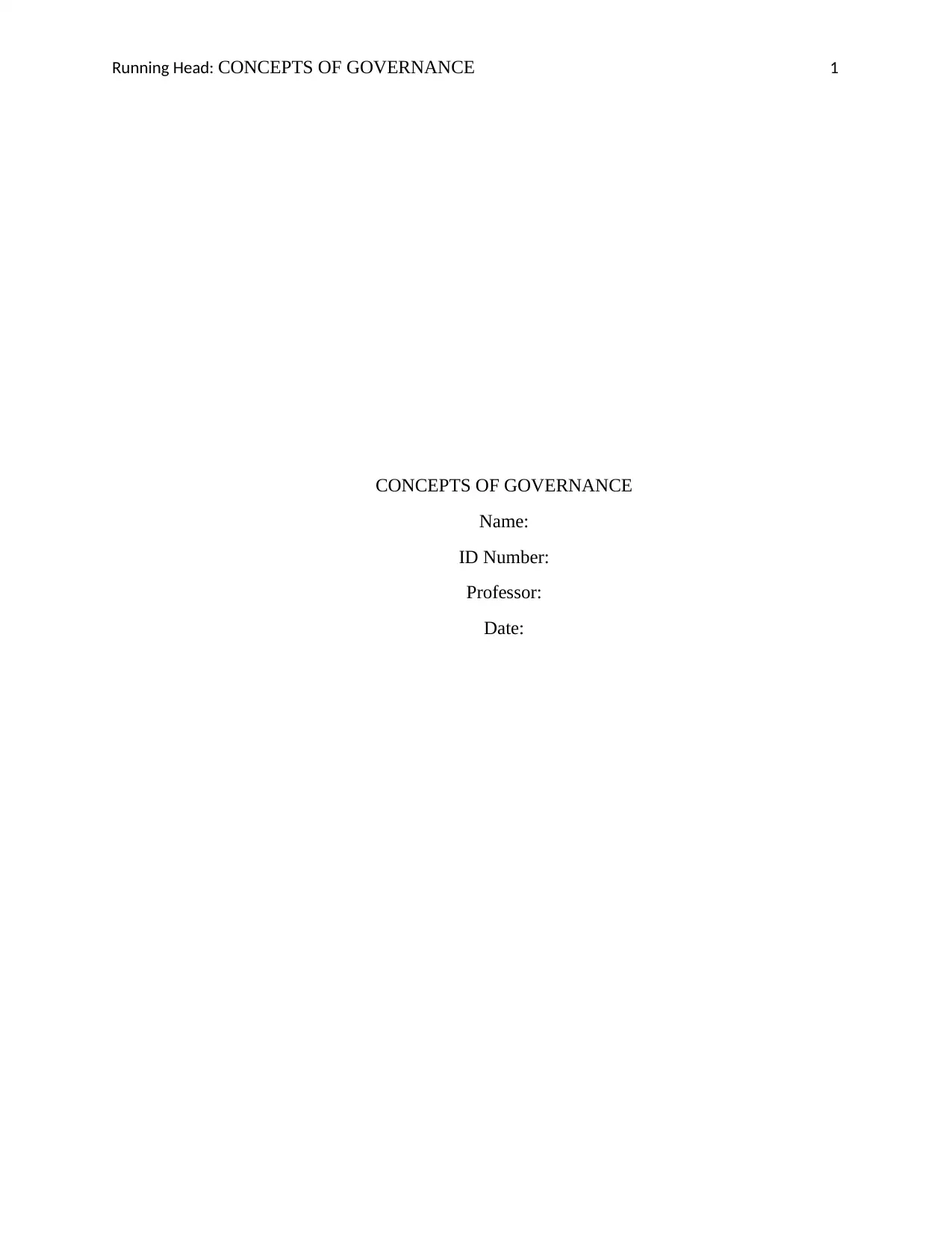
Running Head: CONCEPTS OF GOVERNANCE 1
CONCEPTS OF GOVERNANCE
Name:
ID Number:
Professor:
Date:
CONCEPTS OF GOVERNANCE
Name:
ID Number:
Professor:
Date:
Paraphrase This Document
Need a fresh take? Get an instant paraphrase of this document with our AI Paraphraser
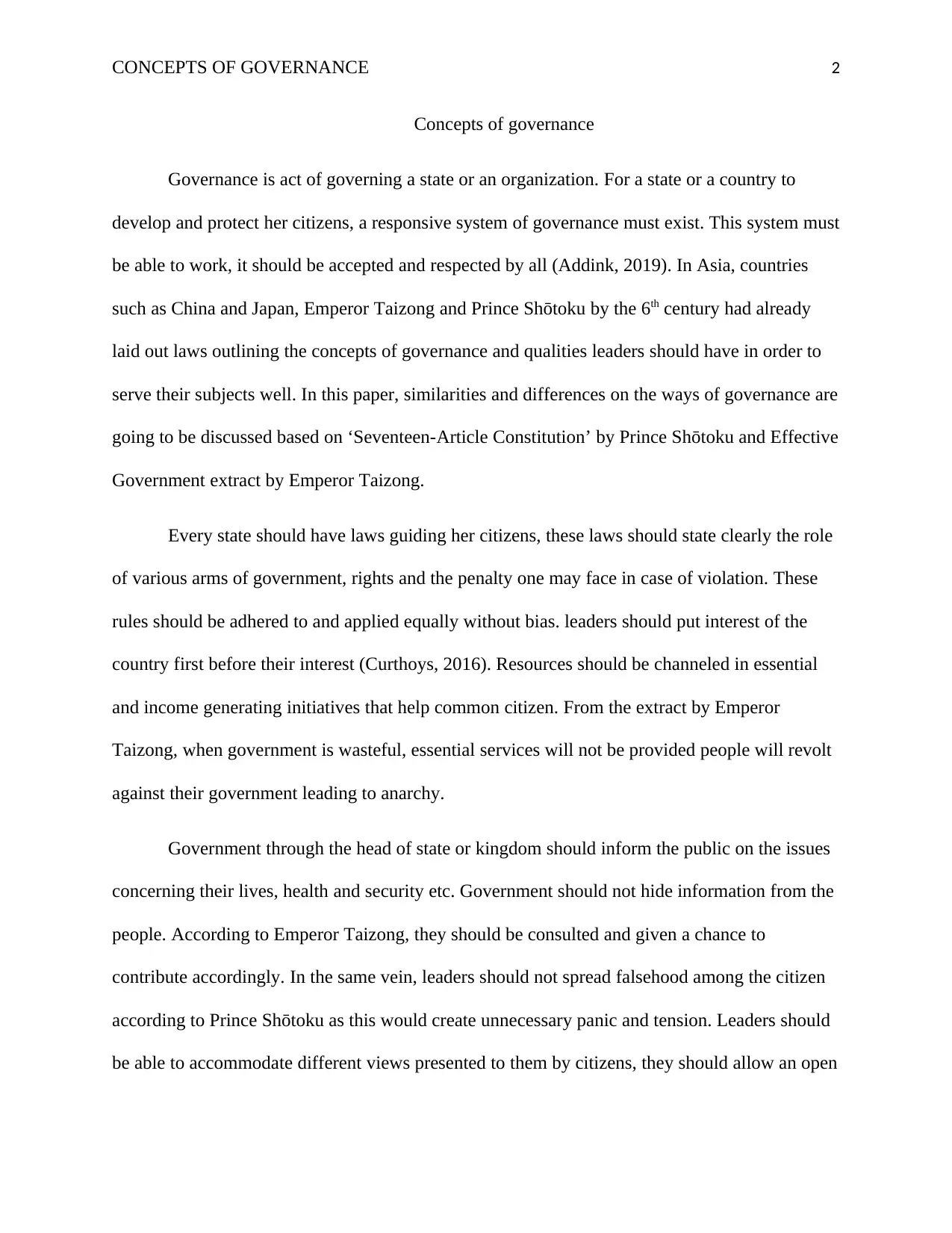
CONCEPTS OF GOVERNANCE 2
Concepts of governance
Governance is act of governing a state or an organization. For a state or a country to
develop and protect her citizens, a responsive system of governance must exist. This system must
be able to work, it should be accepted and respected by all (Addink, 2019). In Asia, countries
such as China and Japan, Emperor Taizong and Prince Shōtoku by the 6th century had already
laid out laws outlining the concepts of governance and qualities leaders should have in order to
serve their subjects well. In this paper, similarities and differences on the ways of governance are
going to be discussed based on ‘Seventeen-Article Constitution’ by Prince Shōtoku and Effective
Government extract by Emperor Taizong.
Every state should have laws guiding her citizens, these laws should state clearly the role
of various arms of government, rights and the penalty one may face in case of violation. These
rules should be adhered to and applied equally without bias. leaders should put interest of the
country first before their interest (Curthoys, 2016). Resources should be channeled in essential
and income generating initiatives that help common citizen. From the extract by Emperor
Taizong, when government is wasteful, essential services will not be provided people will revolt
against their government leading to anarchy.
Government through the head of state or kingdom should inform the public on the issues
concerning their lives, health and security etc. Government should not hide information from the
people. According to Emperor Taizong, they should be consulted and given a chance to
contribute accordingly. In the same vein, leaders should not spread falsehood among the citizen
according to Prince Shōtoku as this would create unnecessary panic and tension. Leaders should
be able to accommodate different views presented to them by citizens, they should allow an open
Concepts of governance
Governance is act of governing a state or an organization. For a state or a country to
develop and protect her citizens, a responsive system of governance must exist. This system must
be able to work, it should be accepted and respected by all (Addink, 2019). In Asia, countries
such as China and Japan, Emperor Taizong and Prince Shōtoku by the 6th century had already
laid out laws outlining the concepts of governance and qualities leaders should have in order to
serve their subjects well. In this paper, similarities and differences on the ways of governance are
going to be discussed based on ‘Seventeen-Article Constitution’ by Prince Shōtoku and Effective
Government extract by Emperor Taizong.
Every state should have laws guiding her citizens, these laws should state clearly the role
of various arms of government, rights and the penalty one may face in case of violation. These
rules should be adhered to and applied equally without bias. leaders should put interest of the
country first before their interest (Curthoys, 2016). Resources should be channeled in essential
and income generating initiatives that help common citizen. From the extract by Emperor
Taizong, when government is wasteful, essential services will not be provided people will revolt
against their government leading to anarchy.
Government through the head of state or kingdom should inform the public on the issues
concerning their lives, health and security etc. Government should not hide information from the
people. According to Emperor Taizong, they should be consulted and given a chance to
contribute accordingly. In the same vein, leaders should not spread falsehood among the citizen
according to Prince Shōtoku as this would create unnecessary panic and tension. Leaders should
be able to accommodate different views presented to them by citizens, they should allow an open
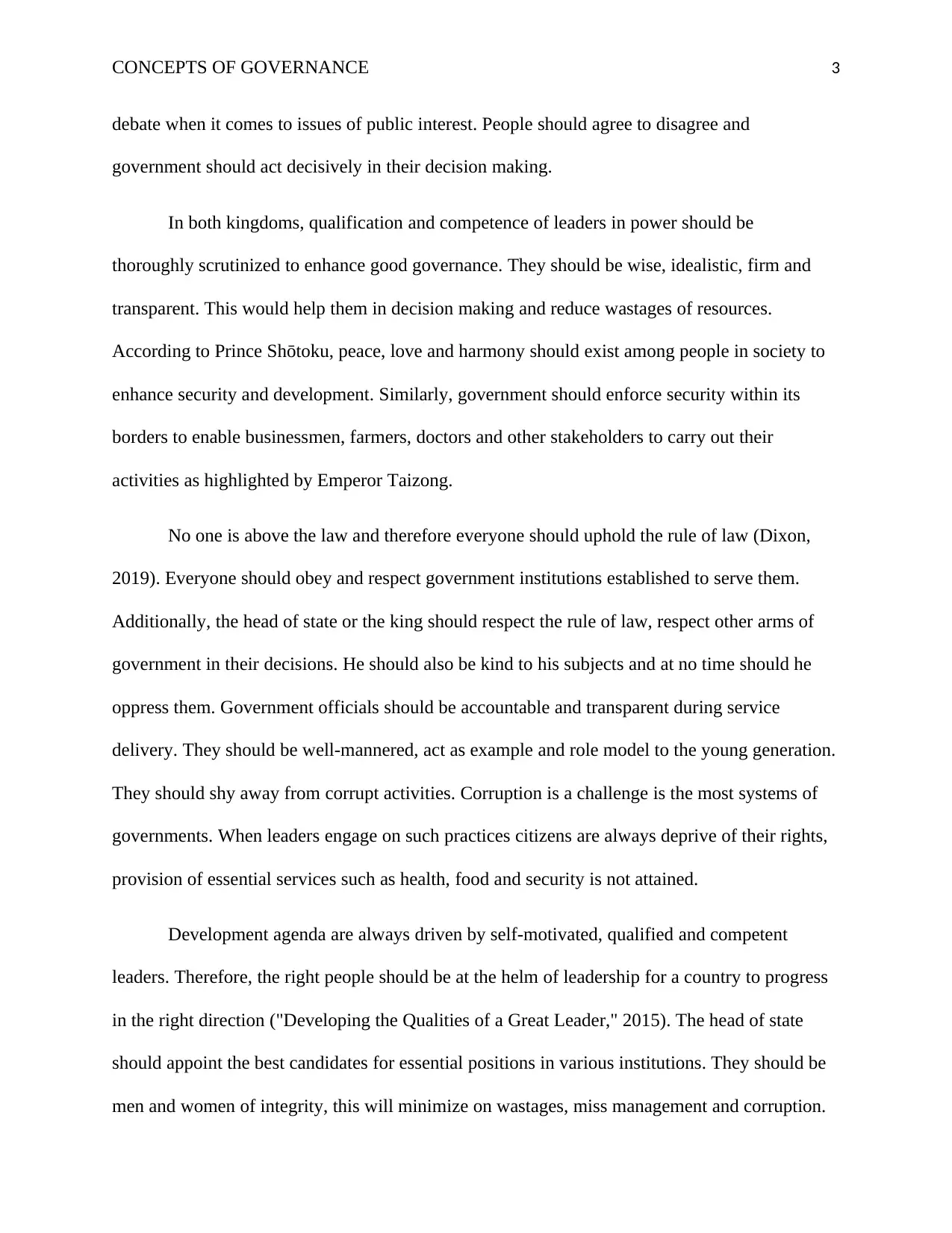
CONCEPTS OF GOVERNANCE 3
debate when it comes to issues of public interest. People should agree to disagree and
government should act decisively in their decision making.
In both kingdoms, qualification and competence of leaders in power should be
thoroughly scrutinized to enhance good governance. They should be wise, idealistic, firm and
transparent. This would help them in decision making and reduce wastages of resources.
According to Prince Shōtoku, peace, love and harmony should exist among people in society to
enhance security and development. Similarly, government should enforce security within its
borders to enable businessmen, farmers, doctors and other stakeholders to carry out their
activities as highlighted by Emperor Taizong.
No one is above the law and therefore everyone should uphold the rule of law (Dixon,
2019). Everyone should obey and respect government institutions established to serve them.
Additionally, the head of state or the king should respect the rule of law, respect other arms of
government in their decisions. He should also be kind to his subjects and at no time should he
oppress them. Government officials should be accountable and transparent during service
delivery. They should be well-mannered, act as example and role model to the young generation.
They should shy away from corrupt activities. Corruption is a challenge is the most systems of
governments. When leaders engage on such practices citizens are always deprive of their rights,
provision of essential services such as health, food and security is not attained.
Development agenda are always driven by self-motivated, qualified and competent
leaders. Therefore, the right people should be at the helm of leadership for a country to progress
in the right direction ("Developing the Qualities of a Great Leader," 2015). The head of state
should appoint the best candidates for essential positions in various institutions. They should be
men and women of integrity, this will minimize on wastages, miss management and corruption.
debate when it comes to issues of public interest. People should agree to disagree and
government should act decisively in their decision making.
In both kingdoms, qualification and competence of leaders in power should be
thoroughly scrutinized to enhance good governance. They should be wise, idealistic, firm and
transparent. This would help them in decision making and reduce wastages of resources.
According to Prince Shōtoku, peace, love and harmony should exist among people in society to
enhance security and development. Similarly, government should enforce security within its
borders to enable businessmen, farmers, doctors and other stakeholders to carry out their
activities as highlighted by Emperor Taizong.
No one is above the law and therefore everyone should uphold the rule of law (Dixon,
2019). Everyone should obey and respect government institutions established to serve them.
Additionally, the head of state or the king should respect the rule of law, respect other arms of
government in their decisions. He should also be kind to his subjects and at no time should he
oppress them. Government officials should be accountable and transparent during service
delivery. They should be well-mannered, act as example and role model to the young generation.
They should shy away from corrupt activities. Corruption is a challenge is the most systems of
governments. When leaders engage on such practices citizens are always deprive of their rights,
provision of essential services such as health, food and security is not attained.
Development agenda are always driven by self-motivated, qualified and competent
leaders. Therefore, the right people should be at the helm of leadership for a country to progress
in the right direction ("Developing the Qualities of a Great Leader," 2015). The head of state
should appoint the best candidates for essential positions in various institutions. They should be
men and women of integrity, this will minimize on wastages, miss management and corruption.
⊘ This is a preview!⊘
Do you want full access?
Subscribe today to unlock all pages.

Trusted by 1+ million students worldwide
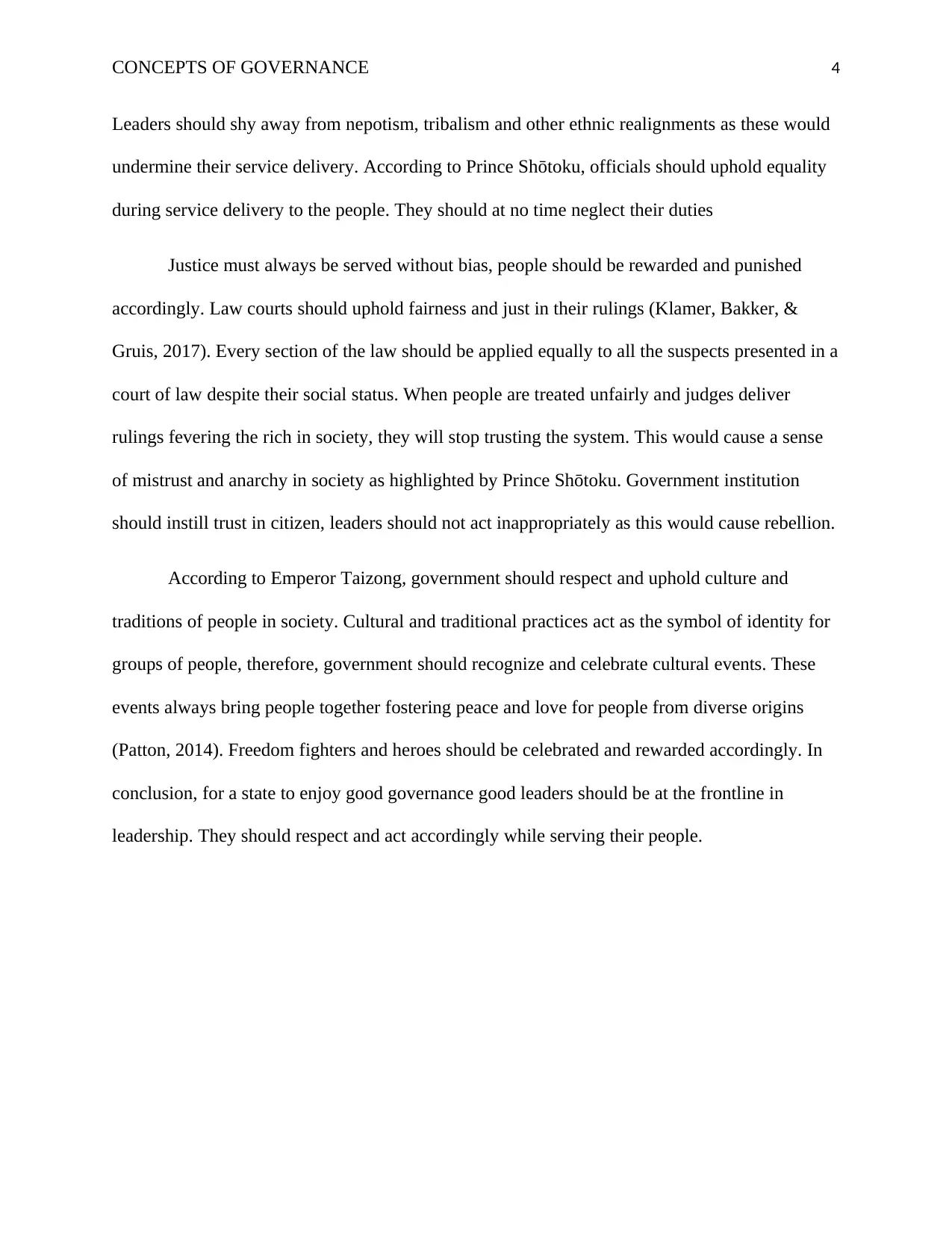
CONCEPTS OF GOVERNANCE 4
Leaders should shy away from nepotism, tribalism and other ethnic realignments as these would
undermine their service delivery. According to Prince Shōtoku, officials should uphold equality
during service delivery to the people. They should at no time neglect their duties
Justice must always be served without bias, people should be rewarded and punished
accordingly. Law courts should uphold fairness and just in their rulings (Klamer, Bakker, &
Gruis, 2017). Every section of the law should be applied equally to all the suspects presented in a
court of law despite their social status. When people are treated unfairly and judges deliver
rulings fevering the rich in society, they will stop trusting the system. This would cause a sense
of mistrust and anarchy in society as highlighted by Prince Shōtoku. Government institution
should instill trust in citizen, leaders should not act inappropriately as this would cause rebellion.
According to Emperor Taizong, government should respect and uphold culture and
traditions of people in society. Cultural and traditional practices act as the symbol of identity for
groups of people, therefore, government should recognize and celebrate cultural events. These
events always bring people together fostering peace and love for people from diverse origins
(Patton, 2014). Freedom fighters and heroes should be celebrated and rewarded accordingly. In
conclusion, for a state to enjoy good governance good leaders should be at the frontline in
leadership. They should respect and act accordingly while serving their people.
Leaders should shy away from nepotism, tribalism and other ethnic realignments as these would
undermine their service delivery. According to Prince Shōtoku, officials should uphold equality
during service delivery to the people. They should at no time neglect their duties
Justice must always be served without bias, people should be rewarded and punished
accordingly. Law courts should uphold fairness and just in their rulings (Klamer, Bakker, &
Gruis, 2017). Every section of the law should be applied equally to all the suspects presented in a
court of law despite their social status. When people are treated unfairly and judges deliver
rulings fevering the rich in society, they will stop trusting the system. This would cause a sense
of mistrust and anarchy in society as highlighted by Prince Shōtoku. Government institution
should instill trust in citizen, leaders should not act inappropriately as this would cause rebellion.
According to Emperor Taizong, government should respect and uphold culture and
traditions of people in society. Cultural and traditional practices act as the symbol of identity for
groups of people, therefore, government should recognize and celebrate cultural events. These
events always bring people together fostering peace and love for people from diverse origins
(Patton, 2014). Freedom fighters and heroes should be celebrated and rewarded accordingly. In
conclusion, for a state to enjoy good governance good leaders should be at the frontline in
leadership. They should respect and act accordingly while serving their people.
Paraphrase This Document
Need a fresh take? Get an instant paraphrase of this document with our AI Paraphraser
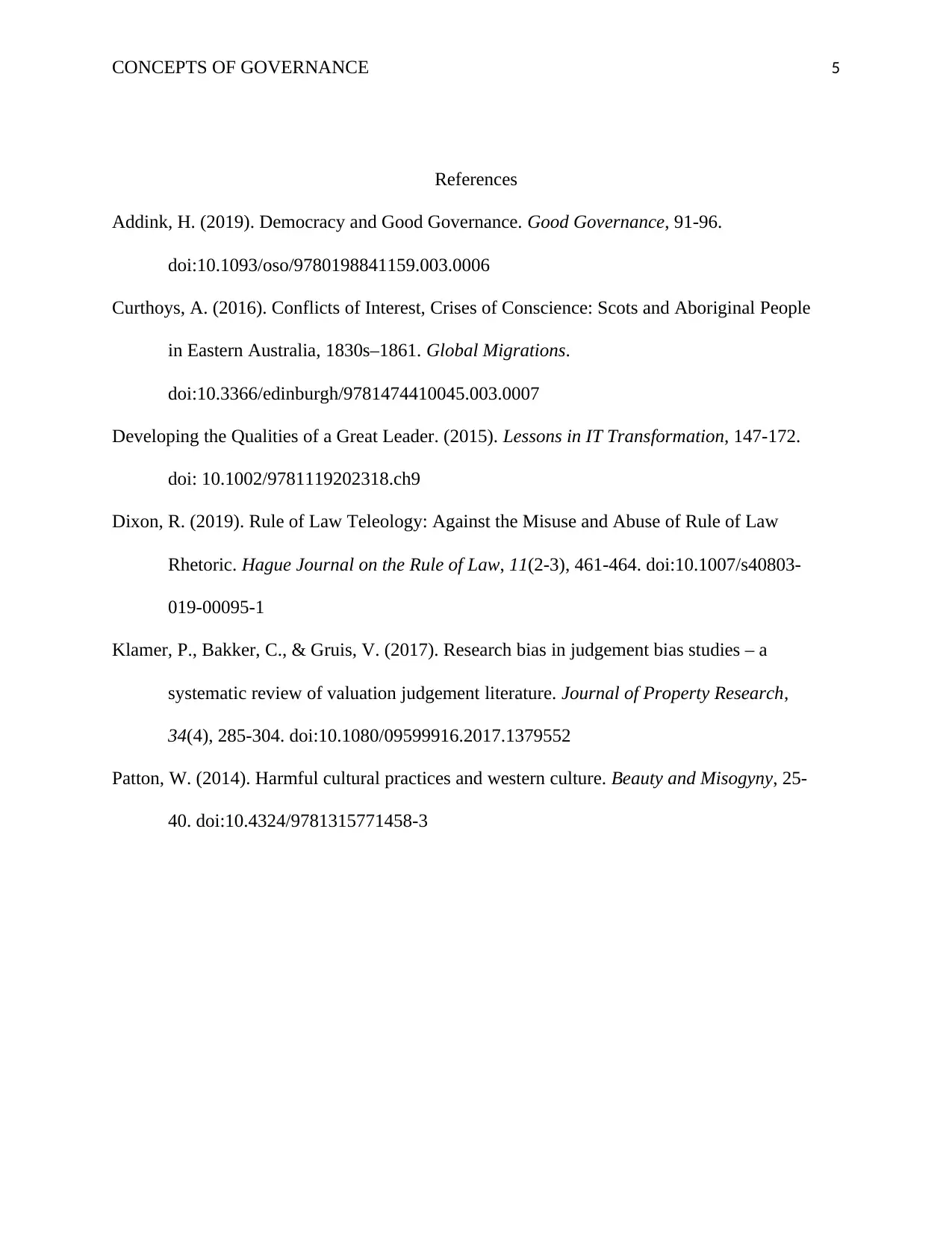
CONCEPTS OF GOVERNANCE 5
References
Addink, H. (2019). Democracy and Good Governance. Good Governance, 91-96.
doi:10.1093/oso/9780198841159.003.0006
Curthoys, A. (2016). Conflicts of Interest, Crises of Conscience: Scots and Aboriginal People
in Eastern Australia, 1830s–1861. Global Migrations.
doi:10.3366/edinburgh/9781474410045.003.0007
Developing the Qualities of a Great Leader. (2015). Lessons in IT Transformation, 147-172.
doi: 10.1002/9781119202318.ch9
Dixon, R. (2019). Rule of Law Teleology: Against the Misuse and Abuse of Rule of Law
Rhetoric. Hague Journal on the Rule of Law, 11(2-3), 461-464. doi:10.1007/s40803-
019-00095-1
Klamer, P., Bakker, C., & Gruis, V. (2017). Research bias in judgement bias studies – a
systematic review of valuation judgement literature. Journal of Property Research,
34(4), 285-304. doi:10.1080/09599916.2017.1379552
Patton, W. (2014). Harmful cultural practices and western culture. Beauty and Misogyny, 25-
40. doi:10.4324/9781315771458-3
References
Addink, H. (2019). Democracy and Good Governance. Good Governance, 91-96.
doi:10.1093/oso/9780198841159.003.0006
Curthoys, A. (2016). Conflicts of Interest, Crises of Conscience: Scots and Aboriginal People
in Eastern Australia, 1830s–1861. Global Migrations.
doi:10.3366/edinburgh/9781474410045.003.0007
Developing the Qualities of a Great Leader. (2015). Lessons in IT Transformation, 147-172.
doi: 10.1002/9781119202318.ch9
Dixon, R. (2019). Rule of Law Teleology: Against the Misuse and Abuse of Rule of Law
Rhetoric. Hague Journal on the Rule of Law, 11(2-3), 461-464. doi:10.1007/s40803-
019-00095-1
Klamer, P., Bakker, C., & Gruis, V. (2017). Research bias in judgement bias studies – a
systematic review of valuation judgement literature. Journal of Property Research,
34(4), 285-304. doi:10.1080/09599916.2017.1379552
Patton, W. (2014). Harmful cultural practices and western culture. Beauty and Misogyny, 25-
40. doi:10.4324/9781315771458-3
1 out of 5
Related Documents
Your All-in-One AI-Powered Toolkit for Academic Success.
+13062052269
info@desklib.com
Available 24*7 on WhatsApp / Email
![[object Object]](/_next/static/media/star-bottom.7253800d.svg)
Unlock your academic potential
Copyright © 2020–2026 A2Z Services. All Rights Reserved. Developed and managed by ZUCOL.



